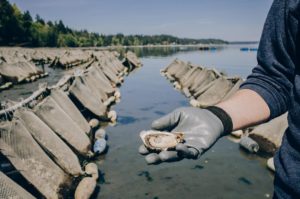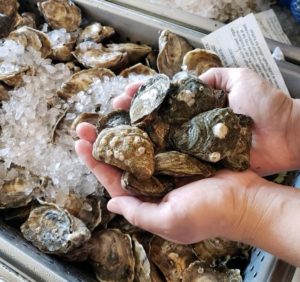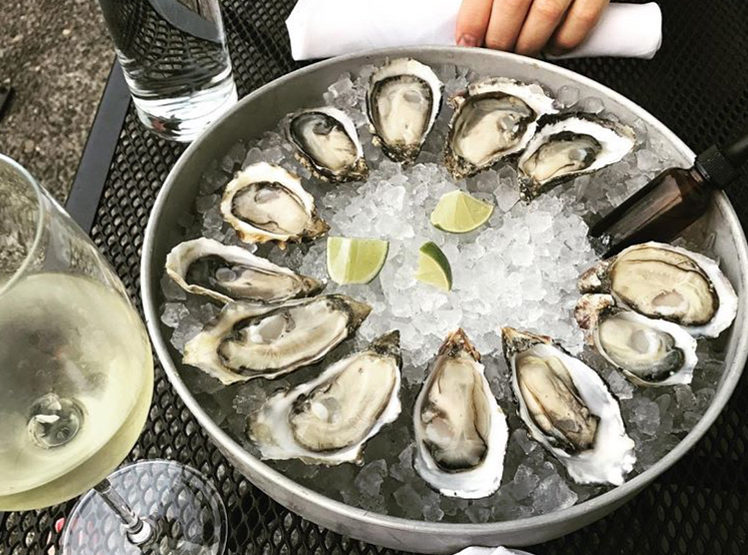From smoked salmon and Tillamook cheese to marionberries and exotic mushrooms, the Pacific Northwest is home to some fantastic foods that rival foodie cuisine from around the world.
 But nobody can top our oysters.
But nobody can top our oysters.
Since 1987, Chelsea Farms has graced the Puget Sound with a fantastic and fresh collection of oysters, clams, and muscles. Over the years, this family-owned business has grown, supplying restaurants and markets from California to New York and everywhere in between. More recently, Chelsea Farms set up shop at the 222 Market in downtown Olympia, bringing to Thurston County an oyster bar that showcases their amazing shellfish.
Whether you are passionate about oysters or a shooter novice, the story behind why this spectacular shellfish stands out is quite interesting.

Marco Pinchot, the business development manager of Chelsea Farms, has been in the shellfish game for more than 10 years. He shares, “I went to school on Bainbridge Island and was very interested in businesses with an environmentally sustainable angle.” Marco can’t help but laugh. “I also knew I wanted to do something with food.”
Through his experience, it was clear that shellfish farming was the way to go. Marco explains, “I believe that farmed shellfish – clams and oysters and muscles – are the most sustainable form of protein production. Period.”
The reason Marco can make such a bold claim is that shellfish farming isn’t simply sustainable – it’s restorative. Marco describes the difference, “Sustainability implies that you can keep doing what you’ve been doing in the past without major adverse impacts on the environment and continue doing that into the future without damaging your environment or community.” He smiles. “Sustainability is a good bar. But if the bar is ‘do no harm,’ ours is actually above that. It’s to improve the environment.”

Nutrient pollution is a big problem in our country. The pollution that humans put into the environment cause algae to grow at an alarming rate. When these algae die and settle to the bottom of their water source, they decompose and produce bacteria that eats away at the oxygen in the water. This kills the fish that live in that environment and can cause harm to the people who use it as drinking water.
Oyster farms, Marco explains, not only bring in the pull to have people clean their water source, the oysters actually help to filter the water. Marco says, “Having more oyster farms is great for the environment. And we need to be doing more of this in Thurston County.”
Chelsea, Hama Hama, and Taylor Shellfish are all local companies making a difference in this tremendous way. “They are all good people,” Marco tells, “and there is plenty of market for all of us.”

The farming happens when the tide is low. For four to six hours at a time, the farmers work, work, work. They seed, perform maintenance, and harvest. During a typical low tide (which can be anywhere between 10 and 15 feet below the high tide), Marco and the other farmers gather oysters and sort them out by hand.
One of Chelsea Farms’ special offerings is their Chelsea Gem. While most oysters grow attached to a surface, the Chelsea Gem is suspended in a bag on a buoy, allowing it to be tumbled in the tide. This creates a unique shape, texture, and taste.
Once the oysters are harvested, it’s all about temperature control. Marco says, “The oysters are kept at bay temperature until they are harvested. Then, they are iced down very quickly.” If you’ve ever heard about people getting sick from oysters, chances are it was because of the temperature. Marco continues, “People get sick from recreational farmers who don’t understand temperature control. You should always buy your oysters from a licensed operation.”
At Chelsea Farms Oyster Bar, you will see one of their farmers (often Marco himself) come in with a cooler filled with ice and oysters, delivered straight from the farm. “Get them there cold and get them there quick,” Marco says.

When it comes to actually serving the oysters, there isn’t too much that needs to be done. Marco tells the restaurant employees, “You are a curator, not an artist. It’s already good – you just need to preserve the beauty.” A fresh oyster should never be fishy tasting. It should smell slightly salty, like a nice sea breeze. The flavor will be clean and slightly sweet. First timers may even enjoy a light squeeze of lemon.
For those that are still a little too timid to try a raw oyster, Marco recommends trying them baked or grilled. While this changes the texture and alters they flavor, they are still very good. And, of course, you can always order the oysters fried, which is probably the least scary option.
“The product is already perfect,” Marco shares, “And we don’t want to mess that up.” A smile creeps onto his face. “But once you get into it, you are going to love raw oysters.”
For more information about Chelsea Farms, visit their website, Facebook, or Instagram. Or you can visit the Chelsea Farms Oyster Bar at 222 Capitol Way N, Olympia 98501.



















































